Did you know that choosing the right companion plants for your eggplants can significantly boost their growth and overall health? Studies have shown that strategically pairing eggplants with certain plants can result in higher yields, improved flavor, and natural pest control. So, if you want to maximize the productivity of your eggplant garden, it’s time to discover the best companion plants to grow alongside these delicious purple gems!
Key Takeaways:
- Companion planting with the right plants can enhance the growth and flavor of eggplants.
- Eggplant companion plants can naturally repel pests and attract beneficial insects.
- Marigolds, bush beans, peas, spinach, and nightshades are some of the best companion plants for eggplants.
- Avoid planting zucchini, corn, and fennel near eggplants as they can hinder their growth.
- Understanding the compatibility and benefits of companion plants is key to a successful eggplant garden.
What is Companion Planting?
Companion planting is a gardening method that involves growing plants together to mutually benefit each other. It is not just about aesthetics; it is a strategic gardening approach that promotes a harmonious and productive environment.
By carefully selecting companion plants, gardeners can create a diverse ecosystem with a multitude of benefits. The practice of companion planting goes beyond merely sharing space; it is about fostering a mutually beneficial relationship between different plants.
One of the key advantages of companion planting is its ability to repel pests. Certain plants emit natural compounds that can deter insects and other harmful pests, reducing the need for chemical pesticides.
“Companion planting can create a more diverse and resilient ecosystem, repel pests, provide beneficial nutrients, improve soil quality, attract beneficial insects and pollinators, and allow for closer plant spacing.”
In addition to pest control, companion plants can also provide beneficial nutrients to their neighboring plants. Some plants have the ability to fix nitrogen in the soil, enriching it with essential nutrients that promote healthy growth.
Moreover, companion plants can help improve soil quality by enhancing its structure and fertility. Different plants have varying root depths and structures, which can contribute to a healthier and more balanced soil ecosystem.
Another advantage of companion planting is its ability to attract beneficial insects and pollinators. Flowers and herbs can lure pollinators such as bees, butterflies, and hummingbirds, ensuring proper pollination and increased yield for fruiting plants.
Furthermore, companion planting allows for closer plant spacing, making the most efficient use of available space. Instead of leaving large gaps between plants, companion planting optimizes the garden layout, maximizing productivity.
Overall, companion planting is a sustainable and natural gardening method that offers numerous benefits. It creates a diverse and resilient ecosystem, improves soil quality, provides natural pest control, and optimizes plant growth and productivity.
Next, let’s explore the top 5 eggplant companion plants that can bring out the best in your garden.
The 5 BEST Eggplant Companion Plants
When it comes to successful eggplant gardening, choosing the right companion plants can make all the difference. Here are the top 5 companion plants that will enhance the growth and productivity of your eggplants:
- Marigolds: Known for their vibrant flowers, marigolds are excellent eggplant companions. They repel pests with their strong aroma and also improve soil health.
- Bush Beans: As nitrogen fixers, bush beans play a crucial role in providing essential nutrients to eggplants. These legumes help enrich the soil, promoting healthier growth.
- Peas: Similar to bush beans, peas are also nitrogen fixers. They work in harmony with eggplants, ensuring a sufficient supply of nitrogen, which is vital for their development.
- Spinach: Spinach acts as a living mulch, providing shade for eggplant roots and helping to retain moisture in the soil. It also contributes valuable nutrients, making it a beneficial companion plant.
- Nightshades: Nightshade plants, such as peppers and tomatoes, can be compatible companions for eggplants if properly managed. However, it is important to practice crop rotation to prevent disease buildup.
By planting these companion plants alongside your eggplants, you can create a thriving garden ecosystem that benefits all the crops involved. The synergistic relationship between these plants helps deter pests, enhance soil fertility, and maximize the overall health and productivity of your eggplants.
| Eggplant Companion Plants | Benefits |
|---|---|
| Marigolds | Repel pests and improve soil health |
| Bush Beans | Act as nitrogen fixers and provide essential nutrients |
| Peas | Contribute as nitrogen fixers, enriching the soil |
| Spinach | Act as living mulch and provide shade and nutrients |
| Nightshades | Beneficial if properly managed with crop rotation |
Having these eggplant companion plants in your garden not only promotes healthier growth but also creates a visually appealing and diverse environment. The interplay of colors, scents, and textures adds beauty and interest to your garden space, while the mutual benefits ensure the overall success of your eggplant harvest.
By incorporating these top 5 companion plants into your eggplant garden, you can enjoy a bountiful harvest while fostering a sustainable and thriving ecosystem.
3 Plants to AVOID Near Eggplant
When it comes to companion planting for eggplants, it’s not just about selecting the right plants to grow together. It’s also important to know which plants to avoid. In this section, I’ll discuss three plants that you should steer clear of when planting eggplants: zucchini, corn, and fennel.
Zucchini
If you’re a fan of zucchini, you might be tempted to plant it alongside your eggplants. However, it’s best to keep these two plants separate. Zucchini plants have a tendency to spread out and take up a lot of space, which can shade out the eggplants and hinder their growth. Additionally, zucchini and eggplants have similar nutrient requirements, so they may end up competing for vital resources, resulting in stunted growth for both plants.
Corn
Corn is another plant that should be avoided near eggplants. Like zucchini, corn plants can tower over eggplants, depriving them of much-needed sunlight. Moreover, corn and eggplants have comparable nutrient needs, meaning they will be competing for the same resources in the soil. Planting them together can lead to nutrient deficiencies and overall poor growth for both crops.
Fennel
Fennel is a beautiful herb with a distinct flavor, but it’s not a good companion for eggplants. Fennel secretes compounds that can inhibit the growth of nearby plants, including eggplants. Additionally, planting fennel near eggplants can affect the taste of the eggplants and other crops, giving them an undesirable flavor. It’s best to keep fennel in a separate area of your garden away from your eggplants.
In conclusion, to ensure the optimal growth and productivity of your eggplants, it’s important to avoid planting them near zucchini, corn, and fennel. By cultivating the right companions and steering clear of incompatible plants, you’ll create a harmonious garden environment that allows your eggplants to thrive.
| Plant | Reason to Avoid |
|---|---|
| Zucchini | Shades out eggplants, competes for nutrients |
| Corn | Overshadows eggplants, competes for nutrients |
| Fennel | Inhibits growth, affects taste of eggplants |
Benefits of Companion Planting Eggplant
Companion planting eggplants offers several benefits. It can boost the growth of eggplants and other crops, deter pests, attract beneficial insects and pollinators, improve soil health, optimize garden space, and enhance flavor. By strategically selecting companion plants, you can create a balanced and productive garden ecosystem.
Companion planting acts as a natural defense mechanism, effectively deterring pests that can damage your eggplants. For instance, planting marigolds nearby naturally repels harmful insects and nematodes, protecting the eggplant foliage and roots. The strong aroma of marigolds masks the scent of eggplants, making them less attractive to pests.
Not only does companion planting deter pests, but it also attracts beneficial insects and pollinators. Plants like bush beans and peas attract pollinators such as bees, butterflies, and hummingbirds, ensuring proper fertilization of eggplant flowers and maximizing fruit production.
Companion planting also enhances the flavor of eggplants and other crops. For example, planting onions near eggplants improves their taste and aroma. The sulfur compounds released by onions enhance both the flavor and the health benefits of the neighboring eggplants.
In addition, companion plants contribute to the overall soil health in your garden. Certain plants, like spinach, act as living mulch, protecting the soil from erosion and regulating moisture levels. Spinach also adds organic matter to the soil as it decomposes, enriching it with essential nutrients.
Furthermore, companion planting allows you to optimize your garden space by intercropping and using vertical space effectively. By planting taller companion plants such as corn or trellised tomatoes alongside eggplants, you can make the most of limited space and increase overall productivity.
In summary, the benefits of companion planting for eggplants are numerous. It boosts their growth, deters pests, attracts beneficial insects, improves soil health, optimizes garden space, and enhances flavor. By harnessing the power of companion planting, you can create a thriving and harmonious garden environment.
The 7 Best Eggplant Companion Plants
When it comes to companion planting with eggplants, there are several options that can enhance their growth, repel pests, and improve overall garden health. Here are the 7 best eggplant companion plants:
1. Beets:
Beets are excellent companions for eggplants as they help prepare the soil. Their deep taproots break up compacted soil, improving drainage and making it easier for eggplants to establish their roots. Planting beets alongside eggplants also adds a pop of color to your garden.
2. Spinach:
Spinach serves as a great companion for eggplants by providing shade. As eggplants prefer full sun, strategically planting spinach around them can help shield the ground and keep it cool. Additionally, spinach acts as a living mulch, helping retain moisture in the soil.
3. Onions:
Onions are natural insect repellents, making them valuable companions for eggplants. Their pungent smell deters pests and helps protect your eggplants from potential damage. Planting onions alongside eggplants can create a natural barrier against unwanted insects.
4. Brassicas:
Brassicas such as kale and broccoli can deter pests that commonly affect eggplants. They release chemical compounds that repel pests like aphids and cabbage worms, which are known to attack eggplant plants. Incorporating brassicas into your garden can help protect your eggplant crop.
5. Tomatoes and Peppers:
Tomatoes and peppers are part of the nightshade family, just like eggplants. When managed properly with crop rotation, they can be beneficial companions to eggplants. These nightshade plants enhance the flavor of each other when grown together, creating a delicious combination.
6. Beans:
Beans, particularly bush beans, are nitrogen-fixing plants. They have a symbiotic relationship with certain soil bacteria that convert atmospheric nitrogen into a usable form for plants. Intercropping beans with eggplants replenishes nitrogen in the soil, promoting healthy growth for both plants.
7. Table: Summary of Best Eggplant Companion Plants
| Companion Plant | Main Benefit |
|---|---|
| Beets | Soil preparation |
| Spinach | Shade and moisture retention |
| Onions | Insect repellent |
| Brassicas | Pest deterrence |
| Tomatoes and Peppers | Flavor enhancement |
| Beans | Nitrogen replenishment |
By incorporating these companion plants in your eggplant garden, you can create a beneficial environment that promotes healthy growth and reduces pest problems. Remember to consider crop rotation and spacing requirements when planning your planting layout.
Bad Companion Plants for Eggplant
When it comes to companion planting for eggplants, it’s important to know which plants can hinder their growth and development. Certain plants, such as potatoes, fennel, cilantro, tomatoes, peppers, and brassicas, are considered bad companions for eggplants.
Here’s why:
- Potatoes: Planting potatoes near eggplants can lead to competition for nutrients, as both crops have high nutrient requirements. This can result in stunted growth and decreased yield for both plants.
- Fennel: Fennel secretes compounds that inhibit the growth of nearby plants, including eggplants. Additionally, fennel can interfere with the taste of other crops, affecting their flavor.
- Cilantro: Cilantro can attract aphids, which can then spread to nearby eggplants and cause damage. Planting cilantro away from eggplants can help minimize pest infestations.
- Tomatoes: While tomatoes are often recommended as companion plants for eggplants, they shouldn’t be planted together due to their similar susceptibility to diseases and pests. It’s best to rotate these crops to prevent the buildup of pathogens.
- Peppers: Like tomatoes, peppers can also be susceptible to similar diseases and pests as eggplants. Planting them together can increase the risk of spreading infections. Rotate these crops to maintain the health of both plants.
- Brassicas: Brassicas, such as cabbage, broccoli, and kale, can grow vigorously and overshadow eggplants, limiting their access to sunlight. Additionally, brassicas are susceptible to similar pests, making them bad companions for eggplants.
By avoiding these bad companion plants, you can promote the healthy growth of your eggplants and ensure a bountiful harvest.
| Bad Companion Plants for Eggplant | Reason |
|---|---|
| Potatoes | Competition for nutrients, stunted growth |
| Fennel | Inhibition of growth, interference with flavor |
| Cilantro | Attracts aphids, pest infestations |
| Tomatoes | Disease and pest susceptibility |
| Peppers | Disease and pest susceptibility |
| Brassicas | Shading, competition, similar pests |
Tips for Managing Bad Companion Plants
To effectively manage bad companion plants in your garden, there are several strategies you can employ. By implementing these techniques, such as crop rotation, spatial planning, and regular monitoring, you can maintain a healthy and thriving garden.
Rotate Crops
Crop rotation involves the systematic movement of crops within your garden over successive growing seasons. This practice helps prevent the buildup of pests and diseases that are specific to certain plants. By rotating your crops, you disrupt the life cycles of harmful insects and pathogens, reducing their impact on your eggplants and other plants.
Here is a simple example of a three-year crop rotation plan for eggplants:
| Year | Main Crop | Companion Crop |
|---|---|---|
| Year 1 | Eggplants | Marigolds |
| Year 2 | Tomatoes | Basil |
| Year 3 | Cucumbers | Nasturtiums |
By following a crop rotation plan, you minimize the risk of pests and diseases from continuously affecting your eggplants.
Spatial Planning
When planting your eggplants and their companion plants, it’s important to consider spatial planning. Ensure that the incompatible plants are located at a safe distance from each other to minimize competition for resources and to avoid potential negative interactions.
For example, if you want to grow eggplants alongside peppers, provide enough space between them to allow for proper growth and development. This prevents overcrowding, increases air circulation, and reduces the risk of disease spread.
Regular Monitoring
Regular monitoring is crucial for managing bad companion plants effectively. Keep a close eye on your garden, checking for any signs of pests, diseases, or nutrient deficiencies. Early detection allows for swift intervention, preventing further damage to your eggplants and the entire garden.
Inspect your plants regularly, looking for common signs of pest infestations, such as wilting leaves, chew marks, or unusual discoloration. Monitor the overall health and growth of your eggplants and their companion plants, ensuring they receive adequate water, sunlight, and nutrients.
By implementing these tips for managing bad companion plants, you can maintain a healthy and harmonious garden, allowing your eggplants to thrive and produce a bountiful harvest.
Conclusion
After exploring the world of eggplant companion planting, it is evident that this gardening strategy is a game-changer for maximizing productivity and maintaining the health of eggplants. By carefully selecting the right companion plants, we can create a harmonious garden ecosystem that not only repels pests but also improves soil health and attracts beneficial insects.
Companion planting serves as a natural way to optimize garden space and ensure the well-being of our eggplant crops. By understanding the compatibility and benefits of companion plants, we can create an environment that supports the growth and development of our eggplants, all while enhancing the flavors of our harvest.
To make the most of eggplant companion planting, it is important to remember that different plants have different needs. Paying attention to the specific requirements of each plant and maintaining a balanced garden is crucial. Regular monitoring and adjusting our planting strategies as needed will help us overcome any challenges that may arise.
In conclusion, by implementing eggplant companion planting, we can create a thriving garden that not only maximizes productivity but also maintains the health and vitality of our eggplants. Let’s embrace this gardening method and unlock the full potential of our eggplant crops!

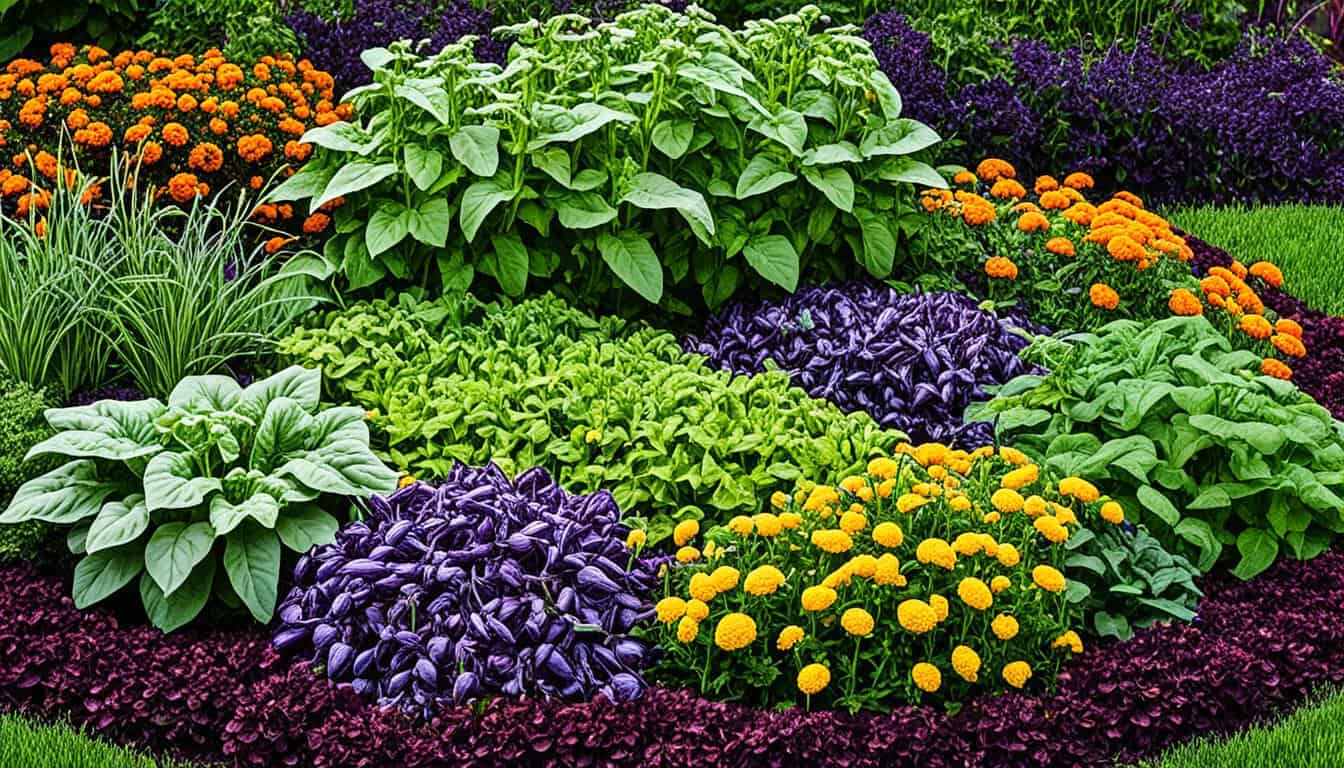
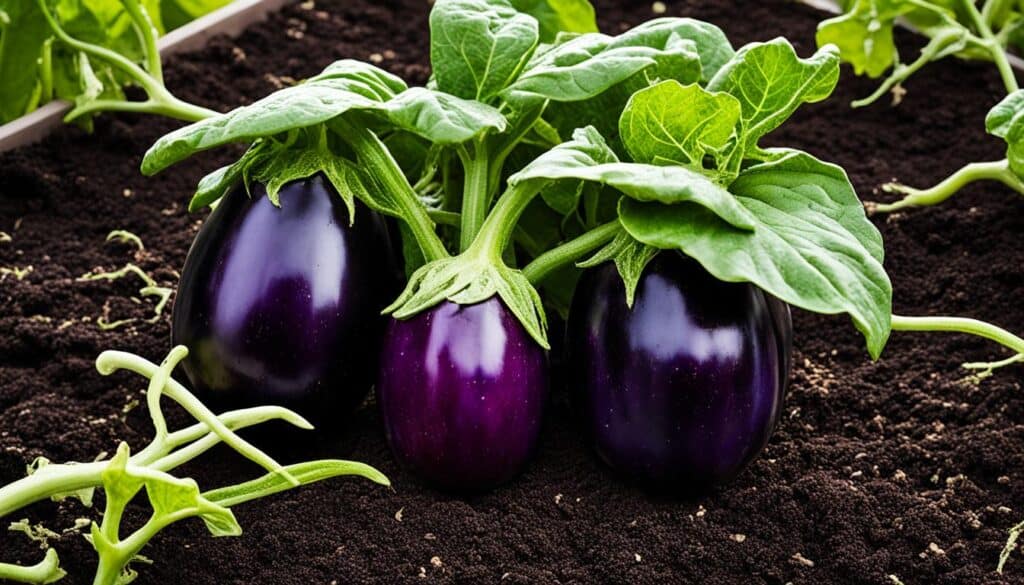
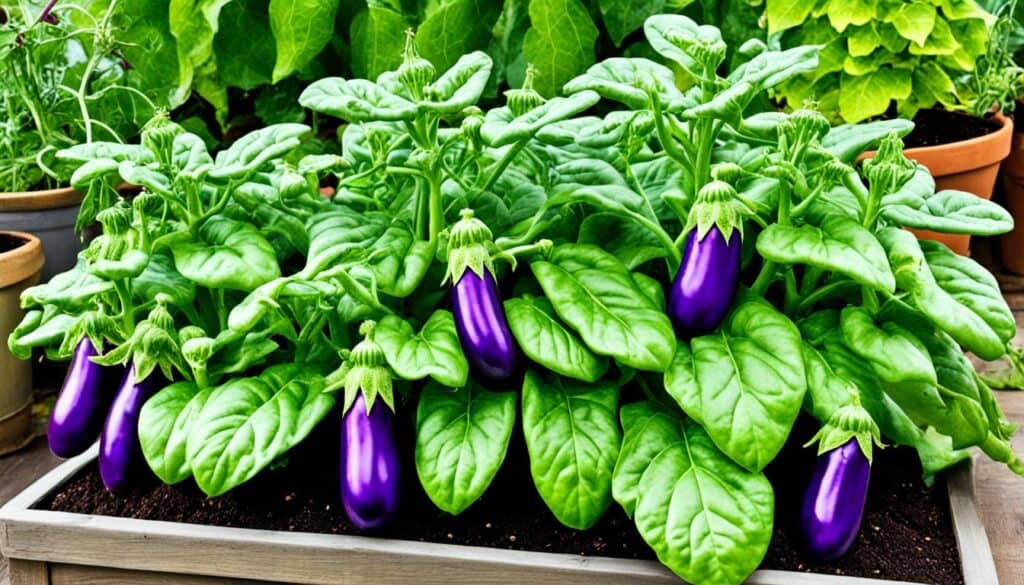
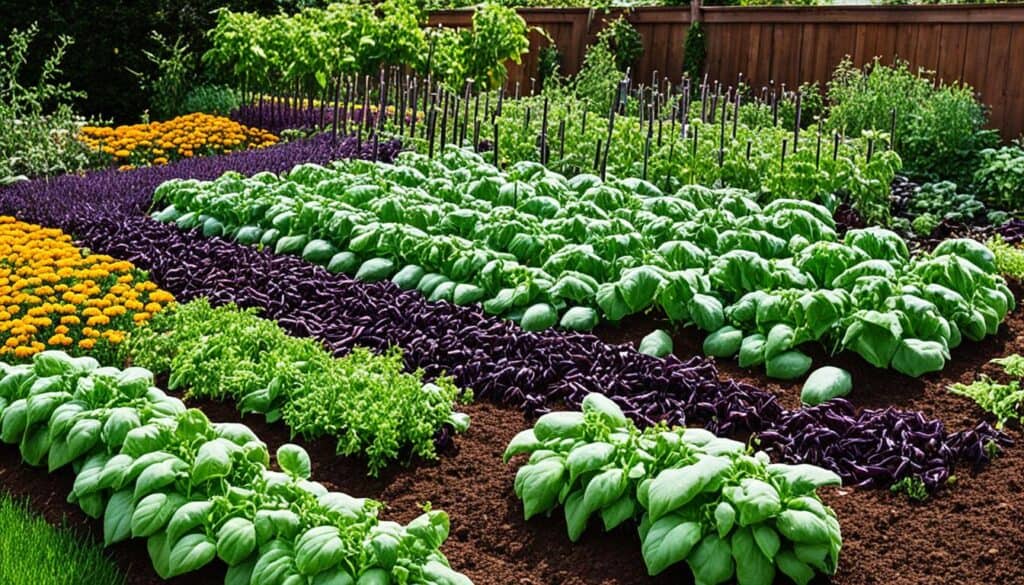

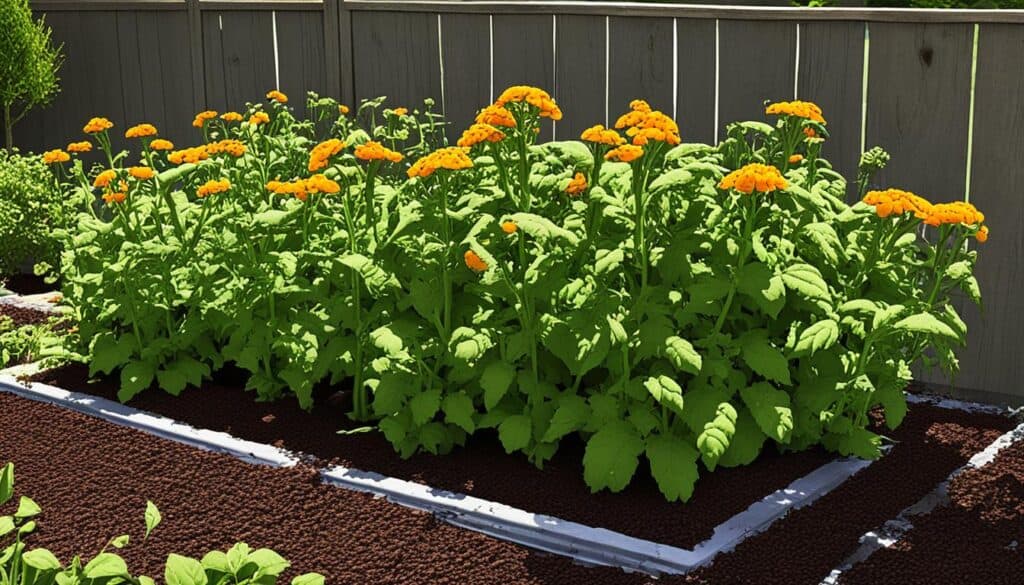



Leave a Reply